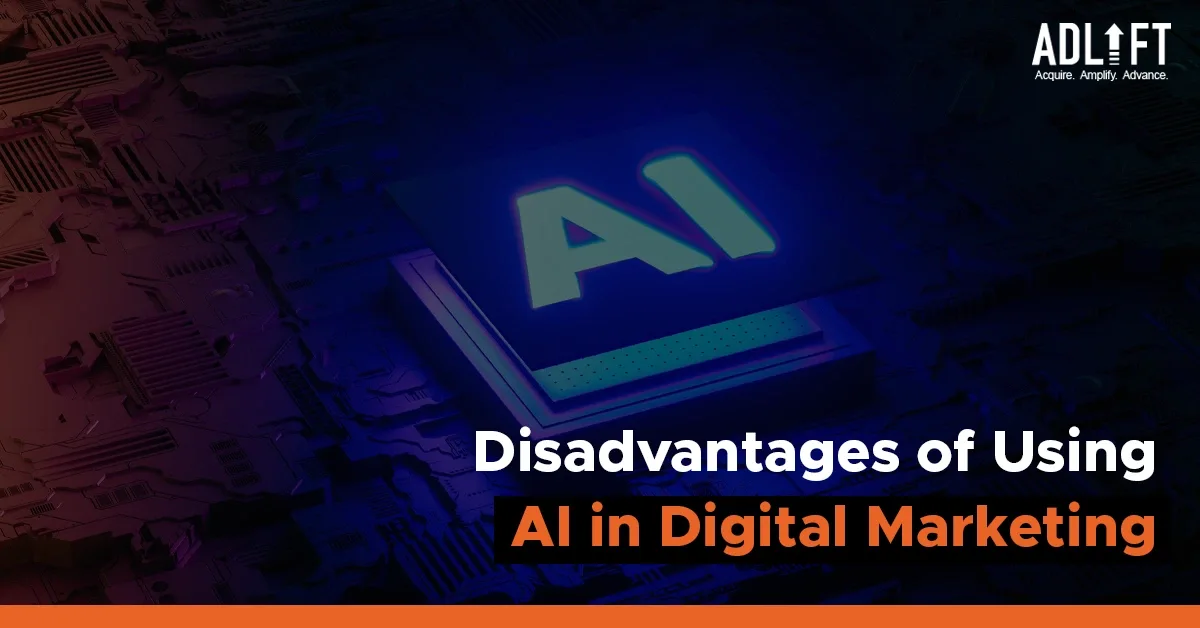Understanding The Disadvantages of Using AI in Digital Marketing

Artificial Intelligence (AI) has revolutionized digital marketing, but it comes with drawbacks. In this article, we’ll explore the AI disadvantages: lack of personalization, ethical concerns, data accuracy dependence, limited creativity, and implementation challenges. Marketers must navigate these AI disadvantages to optimize their strategies.
However, like any technology, AI is not without its drawbacks. In this blog post, we will explore the disadvantages of using AI in digital marketing and the potential challenges and limitations marketers should know.
Top 5 Disadvantages of Using AI in Digital Marketing
Lack of Human Touch and Personalization
One of the primary disadvantages of using AI in digital marketing is the need for more human touch and personalized interactions. While AI can efficiently process vast amounts of data and automate repetitive tasks, it may need help replicating the emotional intelligence and personal touch that human marketers can provide.
Building strong customer relationships often requires empathy, intuition, and the ability to adapt to unique situations, which are areas where AI may fall short.
Ethical Concerns and Privacy Issues
AI-powered digital marketing techniques heavily rely on collecting and analyzing user data to provide targeted advertisements and personalized experiences. However, this raises ethical concerns and privacy issues, among the key disadvantages of using AI in digital marketing.
Consumers are becoming increasingly concerned about their privacy and the potential misuse of their personal information. If not properly addressed, these concerns can lead to a loss of trust, tarnishing a brand’s reputation and impacting its overall success.
Dependence on Data Accuracy and Quality
AI algorithms rely on high-quality, accurate data to make informed decisions and predictions. However, data can be imperfect, incomplete, or biased, leading to poor outcomes. These challenges are among the disadvantages of using AI in digital marketing.
Additionally, AI systems require continuous training and updating to adapt to changing trends and user behaviors. Marketers relying solely on AI without ensuring data accuracy and quality can result in misguided strategies and ineffective campaigns.
Limited Creativity and Intuition
Creativity and intuition are crucial components of successful marketing campaigns. However, when relying solely on AI, there are certain disadvantages to using AI in digital marketing regarding creativity and innovation. While AI can analyze data and provide insights, it may lack the ability to generate innovative ideas or think outside the box.
These limitations can result in AI-driven marketing strategies becoming formulaic and lacking the human touch that sparks true creativity. Marketers should be mindful of balancing the efficiency and automation provided by AI with the need for human creativity and intuition to ensure a well-rounded approach.
Cost and Implementation Challenges
Implementing AI technology in digital marketing requires substantial investment. Building or adopting AI systems, training the algorithms, and integrating them with existing marketing processes can be costly and time-consuming.
Small businesses or those with limited resources may find it challenging to adopt AI on a large scale, potentially creating a disadvantage compared to more technologically advanced competitors.
Conclusion
While AI brings significant advantages to digital marketing, Git is important to recognize and address the associated disadvantages of using AI in digital marketing. Marketers must balance leveraging AI’s capabilities and preserving the human touch that builds genuine customer connections.
By being aware of the limitations of AI in digital marketing, businesses can make informed decisions and develop strategies that harness the strengths of both AI and human marketers. This approach leads to more effective and personalized marketing campaigns, mitigating the potential disadvantages of using AI in digital marketing.
Recent Posts
- The Impact of SEO on Customer Acquisition Costs: Insights from AdLift’s Research July 26, 2024
- What is YMYL Content? A Beginner’s Guide to Google’s Guidelines July 23, 2024
- PPC ROI: Understanding and Measuring Your Return July 18, 2024
- Maximizing Efficiency with Ad Automation July 10, 2024
- How to Create Effective Remarketing Ad Campaigns? July 9, 2024
- Boost Your Strategy with the Right SEO KPIs July 8, 2024
- Top Advertising Metrics to Boost Your Campaign Performance July 2, 2024
- Boost Your Website Traffic with Voice Search Optimization July 2, 2024
- 10 Key Strategies to Boost Your SEO Conversion Rates July 2, 2024
- Maximize Impact with Digital PR Strategies June 25, 2024
Get
in Touch
Contact AdLift for a 360-degree marketing plan

